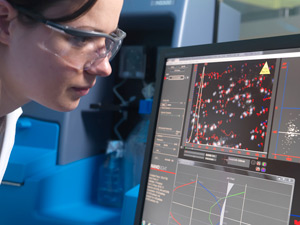Aug 28 2012
NanoSight, leading manufacturers of unique nanoparticle characterization technology, reports on the work of Principal Scientist Dr Damian Marshall and his colleagues at LGC as they develop new methods for characterizing new nanoscale reference materials.

LGC is the UK's designated National Measurement Institute for chemical and bioanalytical measurement, the National Reference Laboratory for a range of key areas, and is also the host organisation for the UK's Government Chemist function.
The potential for nanotechnology to improve human health and aid diagnostic and medical procedures can only be realised if nanomaterials, particularly those for use in nanomedicine applications and consumer products, can be used with no toxic effects. LGC is developing a standardized panel of reference nanomaterials to enable the development of traceable methods for improved in vitro toxicity measurement for safety assessment.
Potential toxicity is difficult to predict. To address this, LGC is developing a panel of nanoparticle reference materials which will be assessed for their physical and chemical properties in an in vitro biological matrix. These reference materials will be based on the high quality nanoparticles produced by the EU-Joint Research Centre (JRC) which have undergone extensive physical characterization in the dry-powder form. LGC are carrying out the characterization work using a unique combination of Nanoparticle Tracking Analysis (NTA - NanoSight, UK), which images and tracks the Brownian motion of particles in solution, with field flow fractionation coupled to inductively coupled plasma mass spectrometry (FFF-ICPMS). This approach will allow complex suspensions of nanomaterials to be characterized for their size, size distribution, charge, concentration, dissolution and elemental composition. Furthermore, NTA is now recognized by ASTM E2834 as a standard for the Measurement of Particle Size Distribution of Nanomaterials in Suspension. With its unique particle by particle method of measurement, NTA provides the ideal insight for this characterization challenge.
Speaking about this project, Damian Marshall said "It is anticipated that this research will produce a prototype panel of reference materials characterized for their properties (size, agglomeration state, elemental composition, and toxicity) in physiologically relevant systems so they can be applied as calibration standards in routine testing procedures. The research should support public acceptance of nanomaterial safety by providing reference materials that can be incorporated into testing regimes for regulatory processes."
The development of a panel of characterized reference materials is timely and important for supporting technological and societal challenges associated with sustainable development, competitiveness, food, health, safety, and environmental issues.
Concluding, Marshall stated "Working together with NanoSight's technical team and its development of NTA has enabled us to significantly improve our toxicity measurements. The efficient sampling process means we are now able to measure size and charge of nanoparticles in cell culture media over a given time period. This has been invaluable in assisting our understanding of how nanoparticles behave in biological systems."
To find out about the company and to learn more about particle characterization using NanoSight's unique Nanoparticle Tracking Analysis solutions, visit www.nanosight.com and register to receive the next issue of NanoTrail, the company's electronic newsletter.